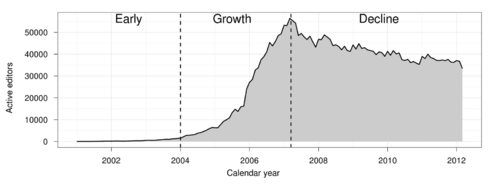Research:Editor retention
Editor retention refers to the continued activity of editors on a Wikimedia project. Open collaboration communities like Wikipedia thrive when participation is plentiful. The success of an open collaboration project appears to be highly correlated with the number of participants it maintains[1]. There are two parameters that are critical to understanding a community's ability to maintain an active community of participants, the rate at which newcomers join the ranks of contributors (see editor activation) and the rate at which existing users are retained (a.k.a. editor retention).
Retention and the English Wikipedia's rise and decline
[edit]Recent work exploring the English Wikipedia's editor decline[2][3]found that, while the rate of editor activation held relatively constant at the beginning of the decline, the retention of desirable new editors dropped substantially[4].


Metrics
[edit]- Returning new editor – An editor who completes at least two edit sessions
- Surviving new editor – An editor who continues to edit within a survival period.
Further reading
[edit]- R:The Rise and Decline – Describes how the adoption of a specific suite of automated quality control technologies in the English Wikipedia lead to declining retention of desirable new editors.
References
[edit]- ↑ Ducheneaut, N. (2005). Socialization in an Open Source Software Community: A Socio-Technical Analysis. CSCW (pp. 323–68).
- ↑ Suh, B., Convertino, G., Chi, E. H., & Pirolli, P. (2009) The singularity is not near: slowing growth of Wikipedia. WikiSym, (pp. 8:1–10).
- ↑ Wikimedia. Editor trends study. http://strategy.wikimedia.org/wiki/Editor_Trends_Study, March 2011.
- ↑ Halfaker, A., Gieger, R. S., Morgan, J., & Riedl, J. (2013). The Rise and Decline of an Open Collaboration System: How Wikipedia's reaction to sudden popularity is causing its decline. American Behavioral Scientist 57(5) 664–88, DOI:10.1177/0002764212469365. summary pdf
